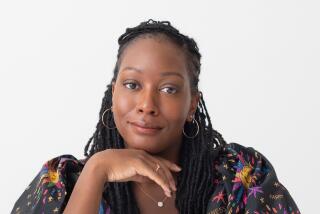‘Motherhood’ the Second Time Around : A group helps grandmothers, who increasingly find themselves the primary caretakers of their children’s children. : LOIS WALTERS
- Share via
So many grandparents are finding themselves taking care of children and they don’t know how to deal with it. The grandparents don’t know how to get the resources they need, how to access the system.
I conceived the idea of forming the National Assn. of African-American Grandmothers in 1983 when I worked at the Los Angeles Unified School District as a public health nurse.
That is where I identified the problem: Grandparents were the primary caretakers of their grandchildren and they were very stressed out. Many came for advice on how to manage these children. At first, I didn’t know what was going on. But I consulted with principals and counselors, and they said many of the kids were exposed to drugs.
At that time, nothing had been set up for these children, many of whom had a short attention span, or were violent or really out of sorts.
My first endeavor was a one-day program in 1985.
I decided to leave the school district and seek a position with the health department where I could have more flexibility to develop a program. I finally had the opportunity to join the child abuse prevention program (with the county Department of Health Services). It gave me the umbrella I needed.
I created a curriculum and researched literature.
Through my courses, I offer instructors from such schools as UCLA and Cal State Long Beach. The courses (Editor’s note: The next series starts March 12. Information: (213) 240-8147.) are open to all, not just African-American grandmothers or those taking care of drug-exposed children.
Many of these children have bizarre behavior, but the severity depends on the extent, and what it was they were exposed to.
How can you deal with these children? Well, certainly, we need to get the children psychologically and biologically evaluated through a regional center, the earlier the better.
If the baby is crying at night, they should be swaddled, with very tight swaddling. They should have soft music as opposed to loud blasting music that is startling. You may hold them a lot, rock them and be very careful of whatever stimulation is there because it should be nurturing and soft.
Another thing I like to focus on is the importance of prenatal care for these mothers. You can reach the mothers through the grandmother. Don’t let anybody kid you. The grandmother loves her daughter and is going to have contact with her regardless of what the court says.
That’s why we have the physician talk about the effects of stimulants and different types of activity have on the development of the fetus.
So what the grandmother learns, she will hopefully pass along. That is the key, because at some point she is going to rejoin, or reconnect with her daughter.
It’s called the Assn. of African-American Grandmothers because that’s the population that I know best, and because that is the population that all the media was focused on in terms of crack.
At one time, it was thought and implied that crack was only accessible to, or used mostly by, African-Americans. Then there were more Hispanics. Finally, if the truth be told, it’s a human condition. It’s one of the crimes usually common to people who live in poverty, or to people who don’t really know who they are and what their history is.
Many don’t have the self-esteem that comes from enrichment because their mothers had to work and drop them off some place.
But drugs are a human problem, so we all have to get along better together. . . . They’re everybody’s problem.
We have many Caucasian babies and other ethnic group babies that have been affected, but many of them have private doctors or the financial status that they don’t have to be caught up in the system of Aid to Families with Dependent Children or in social programs.
You have to take care of all the children, all the grandparents, because in the end, we’re all linked together in society. We have to make it our business to preserve the cultures of all the people. We want these grandparents to be able to pour out love and tradition to these children.
It’s important to keep these grandparents healthy. That’s why in the curriculum we have a class on grandparents’ health. Some of our grandparents are sexually active. We’ve had a grandparent who is 27 years old.
I’ve consulted with at least 50 Caucasian grandmothers, let alone Hispanics, and people from other countries. And the traditional grandparent role is about the same in all countries.
More to Read
Sign up for Essential California
The most important California stories and recommendations in your inbox every morning.
You may occasionally receive promotional content from the Los Angeles Times.










